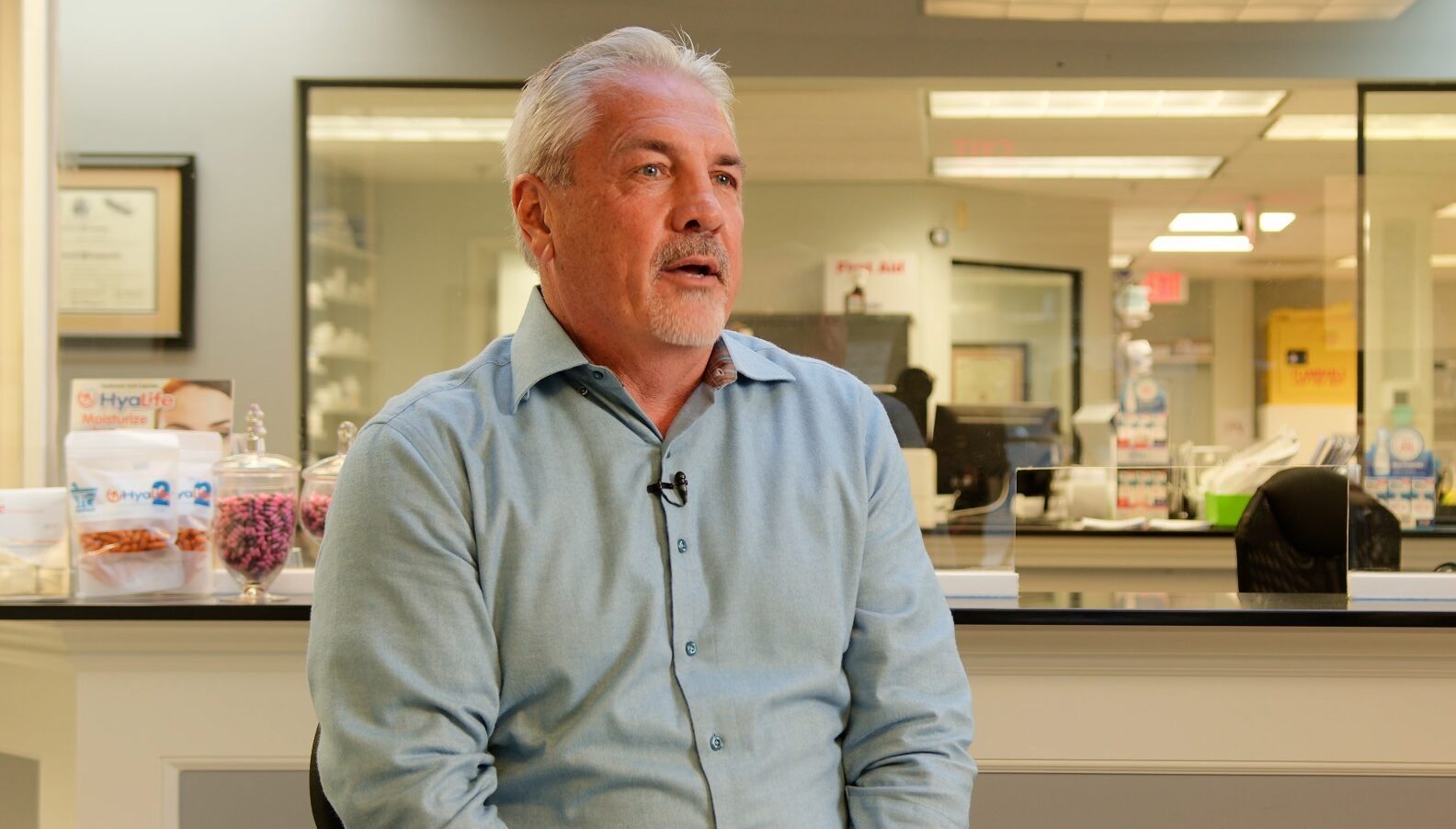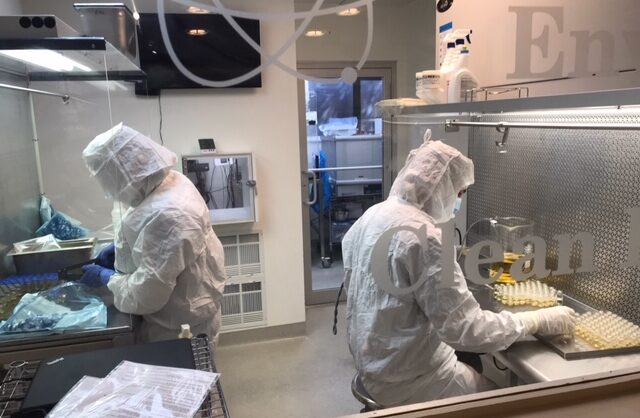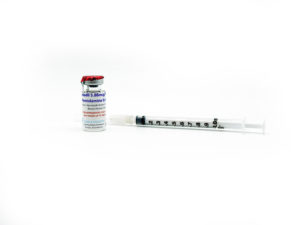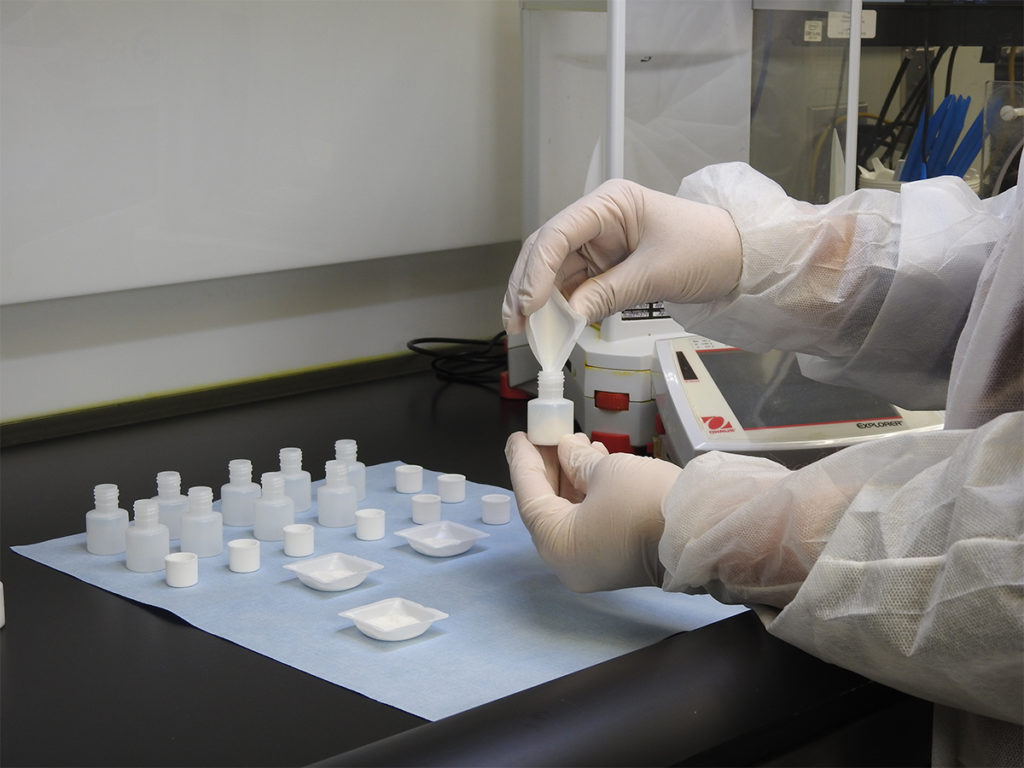Our accreditations place us in the top 1% of compounding pharmacies
Do you know how your sterile compounded medicines are made?
Let us show you how we make ours.

Take a tour of our high-tech sterile compounding labs.
Examples of sterile compounded prescriptions made at Town & Country Compounding

Sterile eye medications
Town & Country Compounding are trusted by ophthalmologists to address several conditions of the eye.
*Click examples below to expand/collapse
Other sterile medications

Prescribers: Tri-mix & Quad-mix Rx Order Form »
Injections that are commonly prescribed for male patients who have had prostate surgery or for males who have not had success with typical therapies for erectile dysfunction (ED).
*Town & Country has patient instructional videos for injections and devices pertaining to ED.
Learn More About Tri-mix or Quad-mix Injections
Ketamine infusion clinics provide the infusion therapy to patients. Ketamine may be used as a part of program for managing psychiatric disorders such as major depressive disorder, treatment-resistant depression, post-traumatic stress disorder, anxiety and acute suicidal thinking and also chronic pain management.
Read More:
We compound various medications for patients who have intrathecal pumps used for chronic pain or spasticity. We can fill orders for intrathecal medications for patients who get their intrathecal pumps refilled either at their doctor’s offices or at home through home care services.
What to Expect: Targeted Drug Delivery >>
Common medications that go into an intrathecal pump for targeted drug delivery are:
- Baclofen
- Morphine
- Clonidine
- Bupivacaine
- Hydromorphone
- Prialt® (ziconotide)
- Fentanyl
Video Resource: Targeted Drug Delivery with Medronic’s Synchro Med II pump
Targeted drug delivery utilizes an implanted, programmable pump to release specific doses of medication for pain or spasticity through a catheter directly into the spinal cord.
“Intrathecal drug delivery offers patients a way to experience pain relief using a fraction of an oral medication dose, which can help to minimize the uncomfortable and sometimes intolerable side effects (e.g., drowsiness, dizziness, nausea, vomiting and constipation) that often accompany pain medication taken orally.”
Source: ABOUT THE THERAPY TARGETED DRUG DELIVERY
Targeted drug delivery also can provide pain relief in patients who cannot achieve adequate analgesia even with high doses of oral opioid medications.
Testing of intrathecal injections at an independent analytical lab
The intrathecal stock solutions have been tested by an independent analytical laboratory to establish that they have maintained their indicated potency and sterility over a 180-day period along with a USP method suitability testing.
Then, once compounded into single dose vials, the intrathecal stock solutions are quarantined, and samples are sent to an independent testing laboratory for the following tests prior to being released from quarantine for dispensing:
- Potency testing
- Sterility testing (USP 71)
- Endotoxin testing (USP 85)
*These are compounded with a prescription for a specific patient
Many times, there are commercially available injectable products that need to be mixed together into an IV infusion. We can prepare them for the individual patient (with a prescription) and send them to the clinic for infusion.
- Vitamin C (ascorbic acid) infusion
- Myers Cocktail
- Glutathione
- Amino acids
Commonly requested injectables that are commercial available and/or compounded
- Glycerin 50%
- Glycerin 72%
- Glutathione 200 mg/ml
- Methylcobalamin 10,000 mcg/ml
- Nicotinamide Adenine Dinucleotide (NAD+) 50 mg/ml
- Pantothenic acid 250mg/ml
- Pyridoxine 100 mg/ml
- Selenium 40 mcg/ml
- Vitamin C
- Vitamin D3 50,000 IU/ml
- Zinc chloride 10mg/ml
Amino Acids:
- Arginine 50 mg/ml
- Carnitine 50 mg/ml
- Glycine 50 mg/ml
- Taurine 50 mg/ml
Drugs used for chemotherapy (chemo) are also referred to as oncology drugs, antineoplastic drugs or cytotoxic drugs. This class of drugs is used in cancer patients but can also be used to treat other things
such as multiple sclerosis (MS), arthritis and others.
Source: CDC
Chemo drugs or other drugs needed during therapy may be sterile or nonsterile, and our labs are prepared to do either type. For example, a customized sterile eye drop, eye ointment or infusion may be
needed. We also provide sterile and non-sterile chemotherapeutic antineoplastic drugs for clinical trials.
Please contact us if you have a specific need or if you are a company in need of a clinical trial.
An elastomeric pump is a disposable one-time use device for a continuous infusion, often used for medications such as:
- Antibiotics
- Chemotherapeutic agents
- Anesthetics
- Analgesics
Uses of Elastomeric Pump & How Is It Used >>
Continuous Ambulatory Delivery Device– a CADD® pump is an infusion pump that you may see at the bedside at a hospital.
It is a reusable medical device that can be programmed to deliver continuous infusion as well as bolus doses for pain management. The patient may be allowed to control when and how often they get a dose of their medication
This pump may be helpful in painful diseases such as pancreatitis, sickle cell anemia or may be used to help ease pain after surgery or ease suffering in end-of-life care (hospice).
Read More: Patient-Controlled Analgesia Pumps
Continuous Ambulatory Delivery Device (CADD®) pump is an infusion pump that you may see at the bedside at a hospital.
It is a reusable medical device that can be programmed to deliver continuous infusion as well as bolus doses for pain management. The patient may be allowed to control when and how often they get a dose of their medication
This pump may be helpful in painful diseases such as pancreatitis, sickle cell anemia or may be used to help ease pain after surgery or ease suffering in end-of-life care (hospice).
We have expanded and are now in our state-of-the-art compounding facility in Ramsey, NJ shipping to multiple states.
Town & Country Compounding has been inspected by the New Jersey State Board of Pharmacy and National Association of Boards of Pharmacy (NABP) in addition to accreditation inspections. We are also accredited by ACHC for sterile compounding, non-sterile compounding, nursing and home infusion.
Town & Country Compounding Is Compliant and goes beyond the requirements of USP 795, USP 797, and USP 800 Guidelines
Our profession has adopted new rules and regulations from the State Board of Pharmacy and the USP (United States Pharmacopeia). We are USP 800 compliant with all aspects as a sterile and non-sterile 503A compounding pharmacy.

Dr. Phillip S. Kim, MD
President, Pennsylvania Pain Society Center for Interventional Pain & Spine
Town & Country Compounding makes customized medication at the highest level.
Their high-tech labs, expertise, and rigorous compounding protocols give me confidence that my patients are getting the best quality compounds.
Sterile laboratories for clinical trials
Premium Standards in Sterile Preparations
We work with Pharma companies, Health systems, and universities and to create sterile and non-sterile medications for clinical trials and drug development.
For example, we work on the development of IND and NDA medications, as well as new delivery vehicles for existing drugs. We also have HD (hazardous drug) labs equipped to compound chemotherapy drugs and other drugs considered hazardous by NIOSH.
Oversight of sterile compounding
Oversight for sterile compounding practice falls primarily to the states and is typically governed by the individual state’s board of pharmacy, however the Food and Drug Administration (FDA) also maintains authority to inspect pharmacies for insanitary conditions.
In some states, the Board of Medicine (or similar entity) regulates sterile compounding that occurs in physician offices. Most pharmacies maintain active accreditation from an agency that performs rigorous inspections for compliance with state laws and internal policies. Majority of state laws and accreditation standards are based on the principles outlined in the U.S. Pharmacopeial Chapter <797> Pharmaceutical Compounding – Sterile Preparations.

